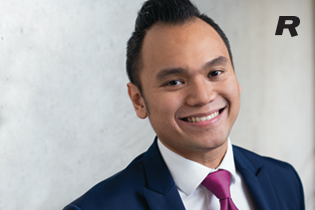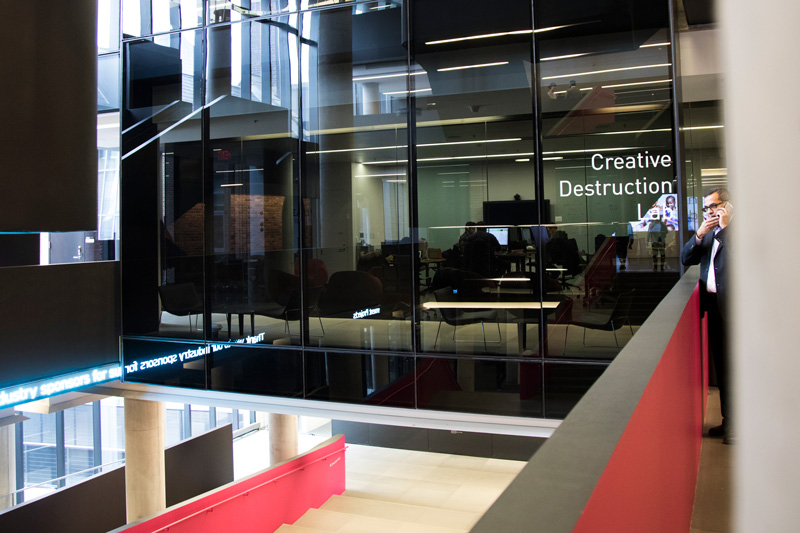 For most of his summer internship, Gabby Ignacio (MBA ’19) operated without a roadmap. At the start of his project with the Financial Innovation Hub in Advanced Analytics (FinHub) — which also served as his MBA internship — he was simply presented with a list nearly two pages long of all the problems facing the exempt market industry in Canada.
For most of his summer internship, Gabby Ignacio (MBA ’19) operated without a roadmap. At the start of his project with the Financial Innovation Hub in Advanced Analytics (FinHub) — which also served as his MBA internship — he was simply presented with a list nearly two pages long of all the problems facing the exempt market industry in Canada.
That was it. There was no fixed schedule, no designated desk at an office and no supervisor to check in with each day.
It was really up to him and his three teammates — fellow U of T graduate students who were studying computer science, electrical engineering and financial engineering — to use their strengths in business and technology to identify the root problems in the current industry. Eventually, they would develop and propose a detailed solution for Vexo, a startup specializing in technology-based financial services, which had compiled the list of issues the students were working from.
“I didn’t need to choose between business school and entrepreneurship. I got the best of both worlds at Rotman.”
—Gabby Ignacio, MBA ’19
Ignacio was one of just a handful of Rotman students who was selected to participate in the competitive FinHub program last year. For one semester, these students team up with graduate students specializing in the applied sciences and an organization embedded in the financial technology sector. Each group is tasked with tackling a real — and often messy — business issue. Though they regularly consult with a faculty mentor throughout the project, the direction of the work is really left in the hands of students.
Some students might find the absence of a defined goal and structure intimidating, but Ignacio and his teammates were inspired.
“The feeling of not knowing where to begin and finding a way forward is pretty common among startups, and a general expectation in the MBA,” he says. “From day one, I felt like my full set of skills was being utilized.”
Business school or starting a business?
As it turns out, working on a messy, undefined problem was exactly the type of experience Ignacio was after.
He had come to the Full-Time MBA program at Rotman as a product manager and sales head in a top global bank, having spent several years before this working in marketing, sales, finance and product management.
Ignacio was looking to establish a global career that would make use of his varied skillset and had narrowed his plans down to two options: business school or establishing his own business.
He decided to pursue the MBA, but was pleased to find several opportunities to acquire hands-on business experience at Rotman.
“It turns out that I didn’t need to choose between business school and entrepreneurship. I got the best of both worlds at Rotman,” says Ignacio, who is also a student with the Creative Destruction Lab (CDL).

The Creative Destruction Lab at the University of Toronto
Tackling the exempt market
At the end of his first year, the newly-launched FinHub started offering students the chance to work on business problems involving finance and technology — and Ignacio jumped at the opportunity. Though there were options to work with banks and other established financial institutions, he wanted to support a smaller venture so that he could make a greater impact and gain startup experience.
“One huge benefit was that there was no hierarchy,” he explains. “Everyone on the team had an equal opportunity to leverage their strengths and abilities to influence the direction of the project.”
As the business manager in the group, Ignacio got to work creating a plan. At the start of each day, he organized 30-minute creativity sessions where the team would brainstorm ideas.
They reviewed the list of issues Vexo had sent them and considered how the exempt market, a private market that allows investors with substantial capital to invest in not-yet-public companies, could be made more transparent and efficient. A strong business opportunity presented itself: the startup could develop a blockchain-based solution so that investors could participate in that market more easily.
From there, Ignacio took the lead researching the legal and compliance issues associated with the Canadian exempt market, determining a budget and getting a handle on the competitive landscape. Meanwhile, his teammates began researching the technology needed to develop a new platform.
By the end of the summer, the team had delivered on providing a sound business and technology strategy to Vexo, but Ignacio’s involvement didn’t end there. Committed to seeing the project through, he started reaching out to blockchain engineers and developers around the world to explore the potential of building a prototype.
Now, as a second-year MBA and CDL student, he’s reached out to his network to see if there are opportunities to secure support and get the idea off the ground.
It’s been an ongoing learning experience that has shaped his MBA experience.
“This whole thing has taught me to look beyond what’s available or obvious,” he says. “It might be better than what you’re aspiring for.”
Written by Rebecca Cheung | More Student Stories »